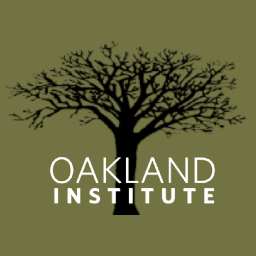Location
The Oakland Institute is a policy think tank whose mission is to increase public participation and promote fair debate on critical social, economic and environmental issues in both national and international forums.
The Oakland Institute’s trademark is to work in coalitions and networks to strengthen social movements, especially as we forge multi-cultural, cross-border and cross-class alliances. As a policy think tank our work is unique (in that we are bringing new approaches to social change including the awareness of economic, social and cultural rights) as we work with grass roots constituency (faith-based, farm workers, immigrant rights groups, Black farmers, among others) and help bridge policy think tanks with activist networks and social movements.
The Institute engages in three main areas of interrelated program work:
- Bringing a social and economic human rights lens to organizing and policy work
- Reframing the debate on security
- Building strategic alliances to strengthen popular struggles nationally and internationally
The Institute addresses this work through education and advocacy activities in national and international forums. Our aim is not just to come up with a list of new policy solutions but to reframe the basic terms on which public debate takes place. Our goal is to stimulate public discussion and debate while creating an informed citizenry that can craft a new vision of action for the future.
Members:
Resources
Displaying 16 - 20 of 37Willful blindness: How World Bank’s coutry rankings impoverish smallholder farmer
While nearly 80 percent of food consumed in sub-Saharan Africa and Asia is produced by smallholder farmers, the Bank negates the importance of small-scale farming for sustainable rural development and food security. Family farmers account for 80 percent of all holdings in the developing world, therefore smallholders’ own investments—not FDIs—are the main force sustaining agriculture and should be encouraged.
Down on the farm: Wall street: America's new farmer
The first years of the twenty-first century will be remembered for a global land rush of nearly unprecedented scale. An estimated 500 million acres, an area eight times the size of Britain, was reported bought or leased across the developing world between 2000 and 2011, often at the expense of local food security and land rights. When the price of food spiked in 2008, pushing the number of hungry people in the world to over one billion, the interest of investors spiked as well, and within a year foreign land deals in the developing
The Great Timber Heist: The Logging Industry in Papua New Guinea
The Great Timber Heist: The Logging Industry in Papua New Guinea, exposes massive tax evasion and financial misreporting by foreign logging companies, allegedly resulting in nonpayment of hundreds of millions of dollars in taxes.
Engineering Ethnic Conflict: The Toll of Ethiopia’s Plantation Development on the Suri People
Report highlights the effects of government actions on the Suri people of south-western Ethiopia, who are representative of numerous ethnic communities whose subsistence practices and culture are treated as impediments to Ethiopian economic growth. Uncovers the truth behind a reported massacre of 30 to 50 Suri people in May 2012 near the 30,000-hectare Malaysian-owned Koka plantation. Reveals the destabilizing effects of foreign investment in south-western Ethiopia and examines the role of international aid programs in supporting forced evictions in the country.
ENGINEERING ETHNIC CONFLICT THE TOLL OF ETHIOPIA’S PLANTATION DEVELOPMENT ON THE SURI PEOPLE
Recently dubbed “Africa’s Lion” (in allusion to the discourse around “Asian Tigers”), Ethiopia is celebrated for its steady economic growth, including a growing number of millionaires compared to other African nations. However, as documented in previous research by the Oakland Institute, the Ethiopian government’s “development strategy,” is founded on its policy of leasing millions of hectares (ha) of land to foreign investors.





